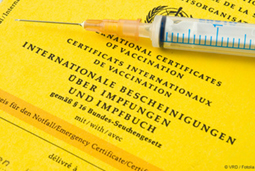Where does vaccine skepticism come from?

Vaccines reliably protect against very dangerous infectious diseases. Nevertheless, their benefits are repeatedly called into question. A pediatric infectiologist explains why this is so, and how vaccinations work.
Vaccinations provide effective protection against measles, whooping cough and a number of other very dangerous infectious diseases. Nevertheless, some parents deliberately decide against immunization because they fear supposed negative effects.
The reasons why some parents refuse to vaccinate, and what to make of this, are explained by Prof. Dr. Philipp Henneke, head of the Pediatric Infectiology and Rheumatology Section of the Center for Pediatrics and Adolescent Medicine at the Medical Center - University of Freiburg.
Professor Henneke, why do you recommend vaccination?
Vaccinations are one of the greatest achievements of modern medicine because they reliably protect against some of the most dangerous infectious diseases. They should be as natural to us as disinfecting wounds or using sterile surgical tools.
Why do some parents not want to allow their children to be vaccinated?
The World Health Organization (WHO) has identified five main reasons for non-vaccination.
(1) Many parents have a lack of confidence in the safety and efficacy of vaccinations. Then even recommendations from recognized institutions such as the Robert Koch Institute are not accepted.
(2) The risk of illness is perceived as low. Many serious infectious diseases such as measles or whooping cough have been greatly reduced in Germany. Therefore few people have personal experience of the dire consequences these can have. This is of course a bit of a paradox, because this security exists only because so many people are vaccinated. We call this "herd protection" and it is especially important for people who cannot be vaccinated, such as infants or people with immunodeficiency.
(3) Purposely exploiting this herd protection and thus refusing vaccination, may also be a reason for the unwillingness to vaccinate. Going by the motto: If all the others are vaccinated, then I am protected too.
(4) In some cases an especially strong desire for information means that many different sources of information are viewed as equally valid. So the vaccination recommendation of the Standing Vaccination Commission (STIKO) is compared to the opinion of a single doctor. Because people tend in general to believe information that fits their own world view, statements by vaccine skeptics are seen to be just as valid.
(5) Sometimes there are also everyday obstacles. The parents have too little time or want to avoid the stress of going to the doctor. Vaccination is perceived as rather unimportant. Here again we have a paradoxical situation: Donations are regularly collected for measles vaccinations in developing countries. The people there sometimes have to travel for days for treatment, whereas in Germany a 20-minute visit to the doctor seems too much trouble. As a result, for years we have been unable to eradicate measles.
What do you say to parents who, for example, refuse a measles vaccination? These parents expose their child to an incalculable risk. In the worst case, children can suffer severe, irreversible brain damage from a measles infection.
How do vaccinations work?
Vaccinations are rather like emergency training for the body. It can prepare against dangerous pathogens without being harmed. The body remembers this immune response and can respond quickly and effectively in case of a real infection. That a vaccine is really like a workout, you also notice in how after vaccination there is sometimes mild fever or malaise. But it usually passes quickly.
Back